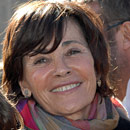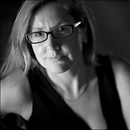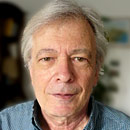Project Description
Prize Winners 2011
Media Prize
Volker Schlöndorff

(photo: SWR/Michael Schulze)
The 2011 Media Prize goes to Volker Schlöndorff. The internationally renowned filmmaker has lived in both Germany and France, and lastingly helped to shape Germany’s image in France with his work for decades. He is a mediator on several levels: between cultures, peoples, art forms and not least of all between generations.

Martine Laroche-Joubert

Alexis Jacquet
The Television Prize is awarded to Martine Laroche-Joubert and Alexis Jacquet for their reportage “An Operetta in Ravensbrück”, shown by France 2. It tells the moving story of the performance of an operetta composed by French prisoner Jermaine Tillon in the women’s barracks of Ravensbrück concentration camp.
The film captivates with its emotionally open meeting of generations and is a document for not turning away. It takes a new look at a part of history that appears to have been all told already. In doing so, it approaches its protagonists with great respect while eschewing effects. The five episodes persuade with their consistent style of cinematic realization.

Martin Durm
The Radio Prize goes to Martin Durm for “Mountain of Sorrow, Mountain of Hope – Searching for Meaning at the Mont Sainte Odile”, broadcast by SWR 2.
This reportage convinced the jury with its high quality, realization and the feelings it arouses. The author shows a high degree of personal involvement. Added to this personal view are many touching eyewitness reports that generate a great density. By personifying the mountain, he succeeds in showing the shared sorrow on both sides of the border. The Mont Sainte Odile brings back the same memories on either, and runs like a red thread through the reportage, which the jury regards as a radiophonic jewel. Thanks to the extraordinary realization, Martin Durm succeeds in providing for “mental cinema” in the best sense of the word.

(photo: Laurent Attias)
In the Print Media category, the prize is awarded to Karin Finkenzeller for her article “The Post Office Stays!”, published in the weekly “Die Zeit”.
The article treats of an economic issue: the privatization of the French Post Office. But instead of only providing bare facts and figures, the author fleshes out her subject so richly in sociological and cultural terms and in the history of mentalities, that reading it will provide German readers, especially, with a better understanding of why the French are so ardently attached to this institution. Finkenzeller succeeds in filling this rather dry subject with so much life that one still thinks of the article’s figures fondly days after reading it and is reminded of the Tati film “Jour de fête.

Michel Verrier
The Internet Prize donated by the Département de la Moselle is awarded to Michel Verrier for the web presentation “www.michel-verrier.com”.
In his press review, Michel Verrier summarizes the latest German daily press. In addition, he also treats of Germany’s key current affairs in his blog. His web presentation is a valuable daily information service for Francophones.
Young Talent Prize donated by the Franco-German Youth Office
Isabelle Foucrier
“Französische Praktikanten im Sauerland”
WDR 5

Dorothee Räber
The Young Talent Prize donated by the Franco-German Youth Office is awarded to Dorothee Räber for her radio feature “French Interns in the Sauerland”, broadcast by WDR 5.
Dorothee Räber has broken new thematic ground with her reportage about the international internships of trainees. The intercultural aspect is elaborated particularly well here. The feature is realized in a modern and attractive manner and holds the listener spellbound right to the end. Besides its topicality and information content, the entry most of all persuades with its high service character. The jury hopes that this decision will have a signal effect for the future to promote the search for new, current and original themes.

